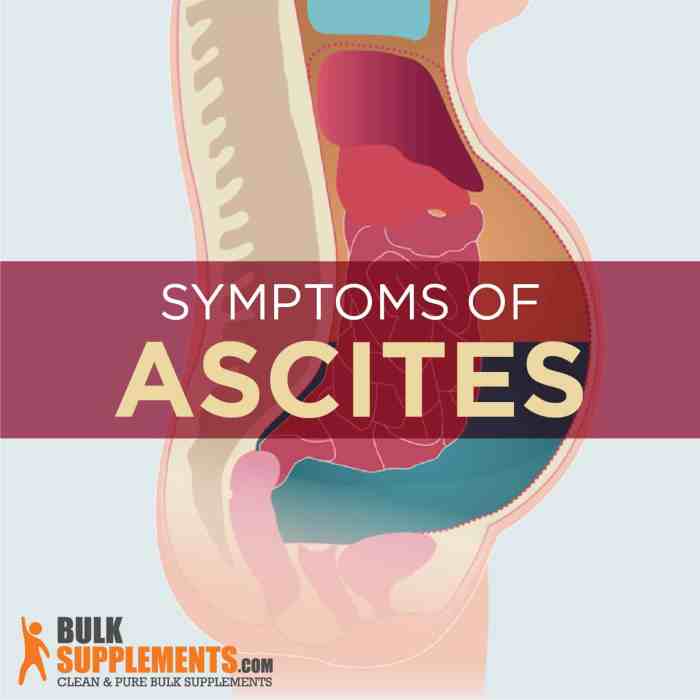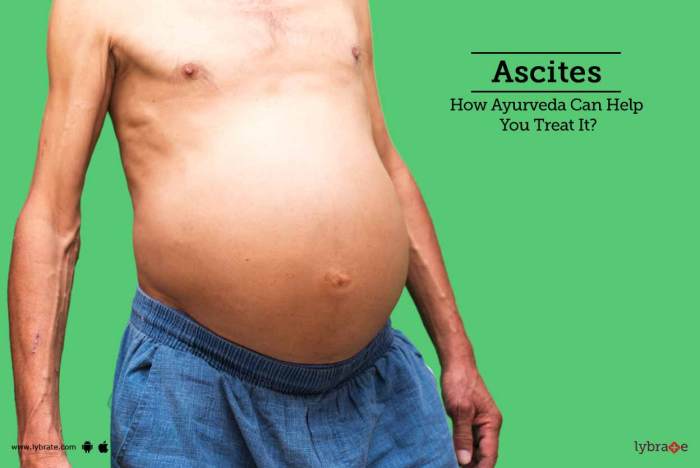Can you suck in ascites? Paracentesis is a medical procedure that uses suction to remove excess fluid from the abdomen. This fluid, known as ascites, can accumulate due to various medical conditions, such as liver disease or heart failure. In this guide, we’ll explore the ins and outs of paracentesis, including its benefits, risks, and how it’s performed.
Paracentesis is a relatively simple procedure that can provide significant relief from the symptoms of ascites. It’s typically performed in a hospital or clinic setting by a doctor or other healthcare professional.
Medical Definition of Ascites

Ascites is a condition characterized by the abnormal accumulation of fluid in the peritoneal cavity, the space within the abdomen that surrounds the abdominal organs. It can be caused by various underlying medical conditions, such as liver cirrhosis, heart failure, kidney failure, and certain types of cancer.Symptoms
of ascites may include abdominal swelling, weight gain, shortness of breath, and discomfort or pain in the abdomen. Ascites can lead to complications such as infections, hernias, and malnutrition if left untreated.
Causes of Ascites
The most common cause of ascites is liver cirrhosis, a condition in which the liver becomes scarred and damaged, leading to impaired liver function. Other causes include:
- Heart failure: When the heart is unable to pump blood effectively, fluid can back up into the abdomen, causing ascites.
- Kidney failure: When the kidneys are unable to filter waste products from the blood, fluid can accumulate in the abdomen.
- Cancer: Certain types of cancer, such as ovarian cancer and liver cancer, can block the lymphatic system, leading to fluid buildup in the abdomen.
Symptoms of Ascites
The symptoms of ascites can vary depending on the severity of the condition. Common symptoms include:
- Abdominal swelling: As fluid accumulates in the abdomen, the abdomen becomes swollen and distended.
- Weight gain: Ascites can lead to significant weight gain due to the fluid retention.
- Shortness of breath: As the abdomen expands, it can put pressure on the diaphragm, making it difficult to breathe.
- Abdominal discomfort or pain: Ascites can cause discomfort or pain in the abdomen due to the pressure exerted by the fluid.
Ascites can also lead to complications such as infections, hernias, and malnutrition if left untreated. Therefore, it is important to seek medical attention if you experience any of the symptoms of ascites.
Paracentesis Procedure
Paracentesis is a medical procedure that involves inserting a thin needle into the abdominal cavity to remove excess fluid (ascites). This procedure is typically performed to relieve discomfort, improve breathing, and prevent complications associated with ascites.
Risks of Paracentesis
- Infection
- Bleeding
- Puncture of the bowel or other organs
- Electrolyte imbalance
Benefits of Paracentesis
- Relief of abdominal discomfort and bloating
- Improved breathing
- Prevention of complications such as infection and organ failure
How Paracentesis is Performed
Paracentesis is typically performed under local anesthesia. The doctor will insert a thin needle into the abdomen, usually just below the navel. The needle is connected to a tube, which drains the fluid into a collection bag.
Ultrasound guidance is often used during paracentesis to help the doctor visualize the abdominal cavity and avoid puncturing any organs.
Complications of Paracentesis

Paracentesis, while generally safe, is not without potential complications. These risks, though uncommon, should be carefully considered before undergoing the procedure.
Can you suck in ascites? No, you can’t. Ascites is a buildup of fluid in the abdomen. It can be caused by many things, including liver disease, kidney disease, and heart failure. If you have ascites, you may experience swelling in your abdomen, legs, and feet.
You may also have difficulty breathing. Treatment for ascites depends on the underlying cause. For more information about ascites, including how to prevent it, visit como se dice game words .
Infection
Infection is a rare but serious complication that can occur when bacteria enter the abdominal cavity during paracentesis. Symptoms of infection may include fever, chills, abdominal pain, and nausea. Prompt treatment with antibiotics is essential to prevent the infection from spreading.
Bleeding
Bleeding can occur if a blood vessel is accidentally punctured during paracentesis. In most cases, the bleeding is minor and stops on its own. However, in rare cases, more significant bleeding can occur, requiring a blood transfusion or even surgery.
Organ Damage
Organ damage is another rare but potential complication of paracentesis. The needle used to perform the procedure can accidentally damage the intestines, bladder, or other organs in the abdominal cavity. This can lead to pain, bleeding, and other serious complications.
To minimize the risks of these complications, paracentesis is typically performed by an experienced physician using sterile techniques. The procedure is also usually performed under ultrasound guidance to help ensure that the needle is inserted correctly.
Role of Suction in Paracentesis

Suction plays a crucial role in paracentesis, a medical procedure that involves the removal of ascitic fluid from the abdominal cavity. The fluid accumulates due to various medical conditions, such as liver cirrhosis or heart failure.The suction device used in paracentesis creates a negative pressure, which draws the ascitic fluid out of the abdomen.
The fluid is then collected in a sterile container for further analysis or disposal.
Types of Suction Devices
Various suction devices can be used in paracentesis, including:
Manual suction
Uses a syringe to manually create negative pressure.
Electric suction
Employs an electric pump to generate suction.
Wall suction
Connects to a central suction system in the hospital.The choice of suction device depends on the patient’s condition, the amount of fluid to be removed, and the availability of equipment.
Patient Monitoring During Paracentesis: Can You Suck In Ascites

Patient monitoring during paracentesis is crucial to ensure the patient’s safety and well-being throughout the procedure.
Vital signs and parameters that should be monitored include:
Blood Pressure
- Blood pressure should be monitored regularly to assess the patient’s hemodynamic status and prevent hypotension.
Heart Rate
- Heart rate should be monitored to detect any arrhythmias or changes in cardiac output.
Oxygen Saturation
- Oxygen saturation should be monitored to ensure adequate oxygenation during the procedure.
Post-Paracentesis Care
After paracentesis, it is essential to follow proper post-care instructions to promote healing and prevent complications.
Pain Management, Can you suck in ascites
Following the procedure, you may experience some discomfort or pain at the puncture site. Over-the-counter pain relievers, such as ibuprofen or acetaminophen, can help alleviate the pain. Your doctor may also prescribe stronger pain medication if necessary.
Wound Care
Keep the puncture site clean and dry to prevent infection. Apply a bandage or gauze dressing to the site as directed by your doctor. Change the dressing regularly, especially if it becomes wet or soiled. Avoid strenuous activity or heavy lifting that could strain the puncture site.
Activity Restrictions
After paracentesis, it is important to rest and avoid strenuous activities. Gradually increase your activity level as tolerated. Your doctor will provide specific instructions on when you can resume normal activities.
Signs and Symptoms of Complications
Contact your doctor immediately if you experience any of the following signs or symptoms:
- Fever or chills
- Increased pain or redness at the puncture site
- Drainage or bleeding from the puncture site
- Shortness of breath or chest pain
- Nausea or vomiting
- Confusion or disorientation
These symptoms may indicate a complication, such as infection, bleeding, or fluid overload, and require prompt medical attention.
Top FAQs
What is ascites?
Ascites is a condition in which excess fluid accumulates in the abdomen. This fluid can cause swelling, discomfort, and difficulty breathing.
What causes ascites?
Ascites can be caused by a variety of medical conditions, including liver disease, heart failure, and kidney disease.
How is ascites treated?
Ascites can be treated with a variety of methods, including medication, diet, and paracentesis.